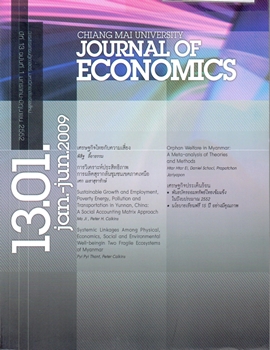Sustainable Growth and Employment, Poverty, Energy, Pollution and Transportation in Yunnan, China: a Social Accounting Matrix Approach
Keywords:
Sustainable Growth, Social Accounting Matrix, Yunnan, Environment, PovertyAbstract
The Chinese government at both national and provincial levels has realized that a balanced and sustainable development strategy must replace the uni-dimensional emphasis on GDP growth in order to lead the nation to a brighter future and resolve the current conflict between economic growth and social development.
The present research was carried out by applying macroeconomic and mesoeconomic methods of social accounting to data from Yunnan province. The bulk of this research is devoted to firstly developing a Social Accounting Matrix ( SAM ) for Yunnan by organizing information about the economic and social structure of the economy of the province in 2002; secondly, to using the SAM to calculate various development multipliers; and thirdly to transforming the matrix into a linear program to calculate optimal resource use and sectoral production levels under various resource constraint scenarios.
The recommendations that flow from this article are that the government should increase investment in agriculture but that subsectoral adjustments should encourage bean production, animal husbandry and forestry rather than grain crop farming to increase productive efficiency. Furthermore, external investments should be combined with a more propitious policy environment to improve telecommunications and logistics and to expand and improve financial and insurance services.
Downloads
Issue
Section
License
All opinions and contents in the CMJE are the responsibility of the author(s). Chiang Mai University Journal of Economics reserves the copyright for all published materials. Papers may not be reproduced in any form without the written permission from Chiang Mai University Journal of Economics.






